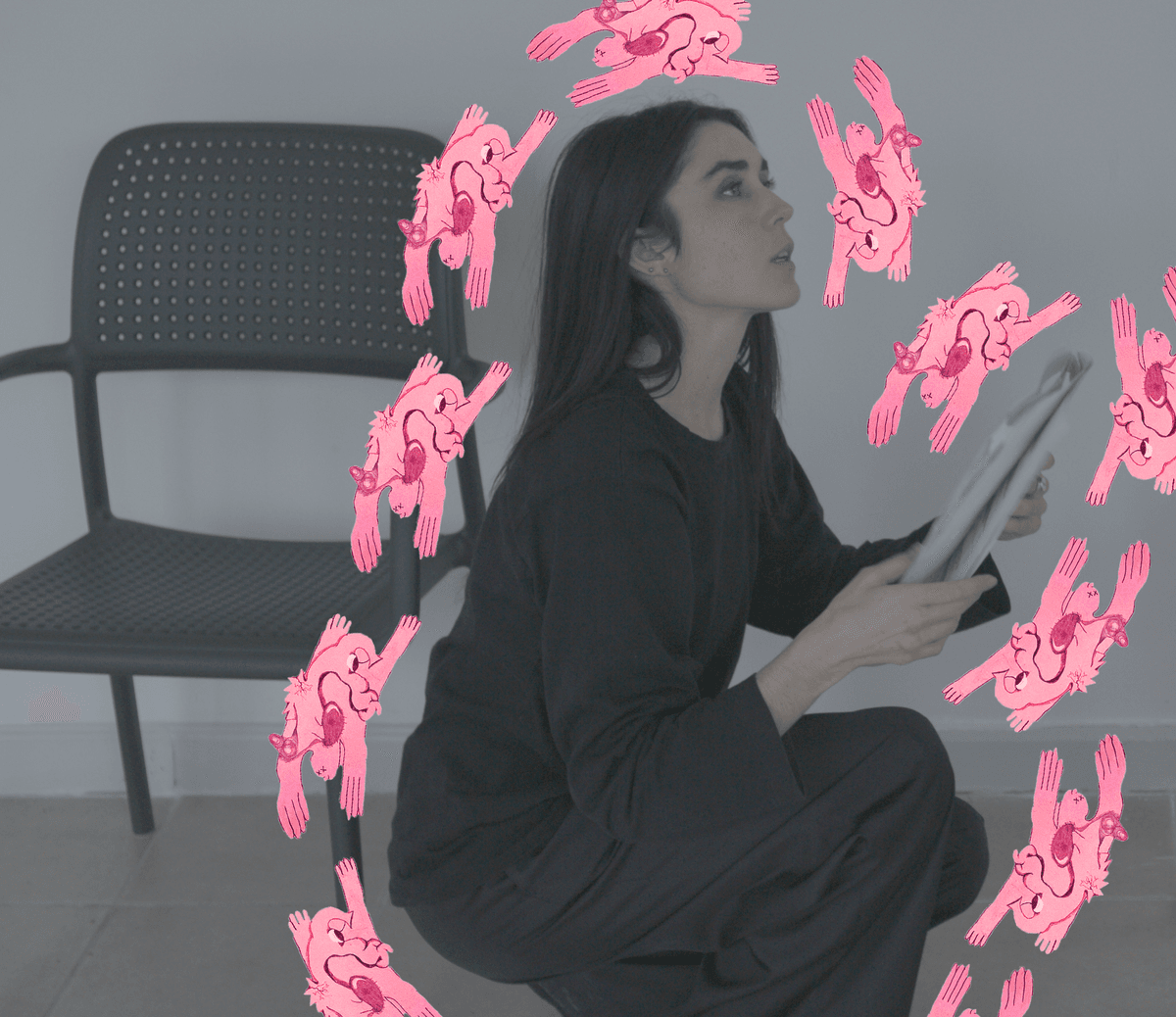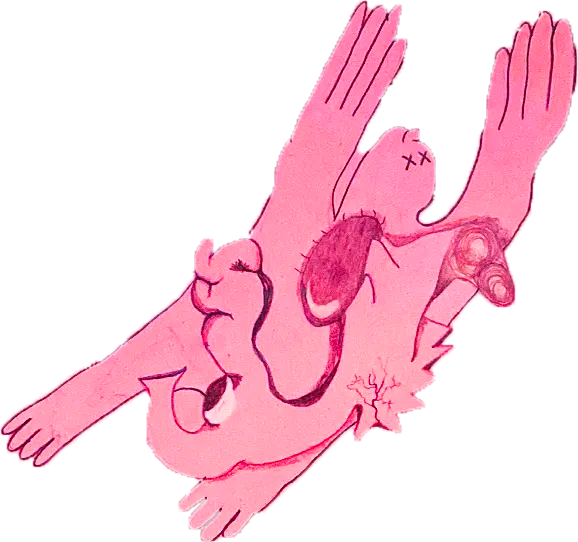SITES OF CONSENT THEATER
Mara McKevitt

There are strong fantasies about work being a separate part of life. Whether or not this fantasy works, I believe it's an inseparable or un-opt-out-able reality. [Work] is the site of repression, dysfunction, consent theater, and incredible disfiguring of language.
RAFF PATEL: Your short film Val is concerned with the politics of sex and surveillance in the context of the workplace. You also have an upcoming solo exhibition at Clementin Seedorf next year based on the character Val. I first became aware of this character through stills you shared on Instagram, but I realized there's a whole lineage to the performance and concept of her that I was unaware of.
MARA MCKEVITT: Val is a character I developed in 2019 — she was an artist I invented who assumed the authorship of the work I made. Initially, I thought of her as working for me, but as I started to build and design her, manage her, prop her up, it became clear that I worked for her. So, I started introducing myself as her assistant. Val went to openings, dinners, interviews; her work was exhibited in galleries. I would show up as "Mara," apologizing for her absence, addressing production issues, stuff that assistants would do. She was in many ways kind of real...it was a dynamic between artist and assistant that is very familiar to people.
RP: You were performing as both Val and yourself to people you knew?
MM: Yeah, some I knew and some I did not. I didn’t feel especially precious about who knew what about Val and myself. I have a lot of respect for artists who commit to lifestyles governed by pseudonymous or otherwise clandestine operations but I don't think that approach would have given me the space to learn what I needed to from this performance. I am really interested in the limits and possibilities of conflicting narratives, the use/abuse of story, gossip — and what happens to a performance that is falsely advertised and/or does not live up to the expectations on behalf of the audience or the author. What happens when you stretch a performance across a three year period? What happens to a performance when performers break character? Can a character be broken decisively? Positioning Val as my boss and myself as her worker in spaces of production was how I started asking those questions.
RP: What do you mean by production? How does production relate to professional spaces, especially artistic ones?
MM: Val was making short films, photography – she was even hired as a producer on other people’s projects. As Val, I hired a photographer to shoot me at Lincoln Center and took an interview with a New York Times writer on Zoom. These are the kinds of spaces I was interested in exploring. I sometimes feel that production can lead to more interesting dramatic material than what we see on screen or what is assigned as the authoritative “final” project. What felt exciting was looking at these spaces as sites of theater - a medium I feel drawn to because in many ways it is aggressively un-documentable, un-renderable. When Val worked in these spaces some people understood her as a real person and myself as this person’s assistant. They were faced with an unstable, shrill, and at times incoherent individual who had poorly applied lipstick, sunglasses, and a long blonde wig. Other people knew this was me. I would occasionally hire people to perform as Val on projects that I was directing and have her attempt to derail what was being worked on. The collision of these different realities and understandings developed beautiful, absurd, funny, and uncomfortable interactions. People are in a setting where millions of decisions are being made, endless problems come up, some are solved, some aren’t, people are working together (some are only pretending they are working together) – it can feel both rigid and intimate. People oscillate between being open-minded and wildly defensive. I think this is true of most work environments — Val was a good controlled variable to bring dramatic potential into a sharper focus.
RP: What was it like working with Emily Allan, who plays Val in the film?
MM: I love Emily. She’s one of the most talented performers I’ve ever encountered. In addition to playing Val, Emily also coached me how to act as myself - an exercise which moved our working relationship into a space where employer/employee and teacher/student dynamics were repeatedly conflicting, dissolving, and reconstructing themselves. She shared with me a very powerful technique that has been passed down to her through a series of oral histories. This method was an incredible feature of our sessions - I have never been so successful in moving beyond the logic-world into the feeling-world. In other words, my performance suffers when I am thinking about what I should do and really becomes interesting the moment I stop thinking/assessing/analyzing and begin feeling… Having had such a profound experience with the technique, I wanted to include the work in the filmed sessions leading up to the film shoot. Emily realized quickly this was not something she would be okay with - and that the technique should stay off camera. This moment opened up a lot of different conversations we wound up having about the alchemical change of the technique once a camera was present, about sanctity, about obscenity…it was a very rich conflict. Emily’s use of language and her expertise as a performer have changed my understanding about acting, about character. Her performances are evidence of this. I hope others get a chance to experience this - she and her partner Leah Hennessey teach classes in NYC.
RP: I’m curious about what draws you to this particular framing of professional environments. What do you think about work, what it can mean, and where it can happen?
When we try to get hired, book a client, a job, whatever, we emphasize our passion for the work and how the money is just sort of incidental – in this way, everyone’s an actor.
MM: I think there are strong fantasies about work being a separate part of life. Whether or not this fantasy works, I believe it’s an inseparable or un-opt-out-able reality. It can be the site of repression, dysfunction, consent theater, incredible disfiguring of language – “Do you want to scrub the floors?,” “Do you want to get on a call?” – obviously you don’t want to, but you will. Some people attempt to leave themselves at home while they work, some people find that bringing all of themselves into work is the only possibility. I get curious results from both of these strategies… I’ve had experiences in certain types of work that felt good and experiences where something felt so bad that I had to figure out how to over-identify with it and develop a saturated interest/affection toward the work — sort of Stockholm Syndrome-y. But this sort of manufacturing of a belief to ensure a correlating behavioral and affective output also feels something like performance. When we try to get hired, book a client, a job, whatever, we emphasize our passion for the work and how the money is just sort of incidental – in this way, everyone’s an actor.
RP: As we also see in the film Val, there's a latent taboo around sexuality in the workplace, which of course has the effect of intensifying everyone’s standing erotic capacity.
MM: Yes. Val merges workplace porn and exaggerated top-down power dynamics with the necrophiliac inclinations of the film and art industries – or the marketability of a dead girl. I think, generally, a lot of work environments require the omission of authentic personal interaction or the enlisting of a decoy authenticity. People become screens you can project onto, which is one aspect of what makes the erotic element so reproducible. The scripts for romance and finance overlap – even a mundane phrase like “I need you to stay late today” makes me think maybe these two people are going to fuck, maybe someone’s in trouble, maybe someone will leave someone in a really compromised position, maybe someone won’t leave at all.
RP: Does it feel Oedipal to kill Val? In playing yourself in the film and Val in real life.
MM: It is… it’s sort of a workplace sabotage and fractured suicide. It was the only logical conclusion for her, for us. To me, the death feels like the most uninteresting part of the whole thing, the most obvious. Val is an incredibly obvious plot: tension, conflict, struggle, resolution. Then there are sort of B-narratives that are not in the film, that influence or exist in the narrative but are not necessarily on screen. It may be more honest if Val is described as one piece of the larger narrative of Val the character. Unfortunately, I might be re-creating a format used by a lot of companies and brands with this sort of amusement park model: “Batman: The Ride”, “Batman: The Ride” cup with crazy straw, “Batman the Ride” T-shirt… except it's not Batman, it’s this crazy bitch named Val who I became obsessed with and around which I have structured several years of work.
Mara McKevitt is a filmmaker and performance artist based out of New York City. Her upcoming solo exhibition will debut at Clementine Seedorf in Cologne, Germany in 2023.
Raff Patel is a writer and editor based out of New York City. Raff was previously an associate editor at Animal Blood and is the editor-in-chief of the forthcoming publication Enter Bliss.
← back to features
